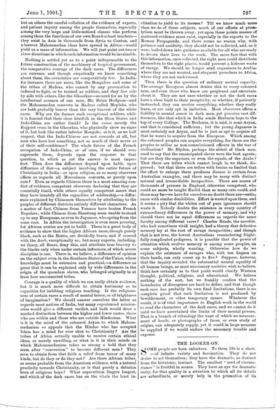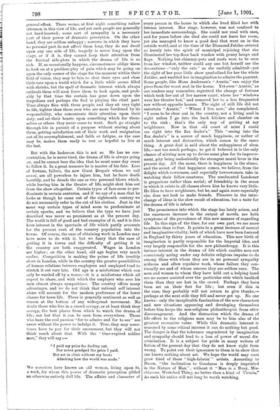THE LOOKER-ON.
S°It°people are born onlookers. To them life is a show, —of infinite variety and fascination. They do not desire to act themselves; they have the dramatic, as distinct from the histrionic, instinct. The smallest "seed of circum- stance" is fruitful in scenes. They have an eye for dramatic unity, for that quality in a situation to which all its details are subordinate, or merely help in the promotion of its
We ourselves have known an old woman, living upon Ss. a week, for whom this power of dramatic perception gilded an otherwise entirely dull life. The affairs and character of general effect. There seems, at first sight, something rather inhuman in this view of life, and yet such people are generally not hard-hearted; some sort of sympathy is a necessary art of their power of dramatic perception. On the other hand, they are seldom unhappy ; sorrows in which they have no personal part do not affect them long, they do not dwell upon any one side of life, tragedy is never long upon the stage, or if it is, they cannot keep their attention from the farcical side-plots in which the drama of life is so rich. If, as occasionally happens, circumstances oblige them to look on at a problem-play of pain which may be going on upon the only corner of the stage for the moment within their field of vision, they may be fain to shut their eyes and close their ears upon a world which for a little while seems filled with shrieks, but the spell of dramatic interest which always enthrals them will soon force them to look again, and prob- ably by that time the curtain has gone down upon the tragedians and perhaps the fool is playing the chief part. Time always flies with these people, and they sit very tight to life, tighter than those men who are more burdened by its responsibility, who concentrate their attention upon their duty, and set their hearts upon something which for them- selves or others they never cease to want. Such go straight through life in pursuit of a purpose without staring about them, getting satisfaction out of their work and resignation out of its accomplishment, and faith or fatigue, as the case may be, makes them ready to rest or hopeful to live at the last.
But with the looker-on this is not so. He has no con- centration, he is never tired, the drama of life is always going on, and he cannot bear the idea that he must some day cease to follow it. In a great measure he is master of his fate. Loss of fortune, failure, the new Giant Despair whom we call ennui, are all powerless to injure him, but he fears death horribly, and he dreads the one or two personal blows which, while leaving him in the theatre of life, might shut him out from the show altogether. Certain types of face seem to pre- dominate in certain centuries, and if we say of a man that he looks as though he came out of the eighteenth century we do not necessarily refer to the cut of his clothes. Just in the same way certain types of mind seem to predominate at certain epochs, and we believe that the type we have just described was never so prominent as at the present day. The world is full of good and bad examples of it, and it is this keen interest in the spectacle of life which partly accounts for the present rush of the country population into the towns. Of course, the ease of obtaining work in London may have more to do with it, but we fancy that the ease of getting it in towns and the difficulty of getting it in • the country are both exaggerated. Wages in London are higher ; on the other hand, old age begins very much earlier. Competition is making the prime of life terribly short in London, while in the country the greater possibilities of human relations between employers and employed tend to stretch it out very late. Old age is a misfortune which can only be warded off by a worse,—it is a misfortune which all expect to share, and with which the employer who sees his men almost always sympathises. The country offers many advantages, and we do not think that rational self-interest alone will account for the modern preference of the lower classes for town life. There is generally sentiment as well as reason at the bottom of any widespread movement. No doubt those who live in a crowd occupy, or at least think they occupy, the best places from which to watch the drama of life ; not but that it can be seen from everywhere. Those who have the real passion "for to admire and for to see" are never without the power to indulge it. True, they may some- times have to pay for their amusement, but they will not think much about that. With the "time-expired soldier man," they will say :— " I paid my price for finding out, Nor never grudged the price I paid, But set in clink without my boots Admiring how the world was made." every person in the house in which she lived filled her with intense interest. Her stage, however, was not confined to her immediate surroundings. She could not read with ease, and for years before she died she could not leave her room, yet she managed to know a good deal that went on in the outside world, and at the time of the Diamond Jubilee entered so keenly into the spirit of municipal rejoicing that she illuminated her top-floor back window with penny lamps and flags. Nothing but chimney-pots and roofs were to be seen from her window, neither could any one but herself see the decorations—" only the cats" as she ruefully admitted—yet the sight of her poor little show symbolised for her the whole Jubilee, and enabled her in imagination to admire the pageant. Some people, like Hans Andersen's "Auntie," can enjoy the piece from the worst seat in the house. Yet even" Auntie," as our readers may remember, regretted the change of fortune which took her out of her narrow court, where her "windows were her theatre box," and removed her to a less frequented row without opposite houses. The sight of still life did not entertain "Auntie." "Where I live now," she complained, "I seem to be clear out in the country, not a living soul in sight unless I go into the back kitchen and clamber on to the sink ; that's the only way of getting at my neighbours. Now in that old court of mine I could see right into the flax dealer's." This seeing into the flax dealer's" is a source of much happiness, or rather of much interest and distraction, which comes to the same thing. A great deal is said about the unhappiness of slum life,—not too much perhaps ; to get it believed in is the only chance of stirring men up to devise some plan for its improve- ment, pity being undoubtedly the strongest moral lever in the present day. All the same, there is happiness in the slums, and the secret of that happiness comes, we believe, from the delight which townsmen, and especially townswomen, take in watching their fellow-creatures. The uneducated Londoner is gregarious rather than social; of friendship in the sense in which it exists in all classes above him he knows very little. He likes to have neighbours, but he, and again more especially she, does not look to make friends. Pleasure in the inter- change of ideas is the slow result of education, but a taste for the drama of life is inborn.
The prominence into which the stage has lately arisen, and the enormous increase in the output of novels, are both symptoms of the prevalence of this new manner of regarding life. In this sign of the time, for our own part, we see more to admire than to fear. It points to a great increase of mental and imaginative vitality, both of which have now been fostered in England by thirty years of education. This new birth of imagination is partly responsible for the Imperial idea, and very largely responsible for the new philanthropy. It is this intense interest in the drama of life which enables men not consciously acting under any definite religious impulse to do among those with whom they are in no personal sympathy arduous and often repulsive work, whose failure they con- tinually see and of whose success they are seldom sure. The men and women to whom they have held out a helping hand are no sooner assisted over the particular stile which baulked them than they are lost in the crowd. Perhaps they have been set on their feet for life ; but even if this is the case, they probably will not return to give thanks,— perhaps at the next stile they fell and never got up. No one knows: only the inexplicable fascination of the new characters and new situations appearing and developing themselves before him keeps the non-religious philanthropist from utter discouragement. And the distraction which the drama of life offers to the religious man may be to him also of the greatest recreative value. While this dramatic interest is seasoned by some ethical interest it can do nothing but good. The danger is that the tolerance engendered by imagination and sympathy should lead to a loss of power of moral dis- crimination. It is a subject for pride in many writers of fiction of the present day that they do not know right from wrong. To point out their ignorance to them is to show that one knows nothing about art. We hope the world may soon grow tired of these " high-falutin' " artists. According to Bacon, "the inclination to Goodness is deeply imprinted in the Nature of Man " ; without it "Man is a Busy, Mis- chievous, Wretched Thing, no better than a kind of Virmin?' As such his antics will not long be worth watching.







































 Previous page
Previous page